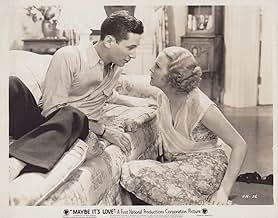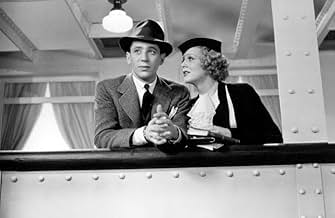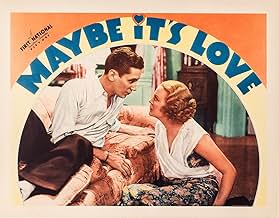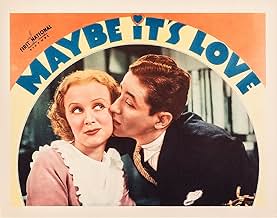A young couple in love who face economic woes once they're wed.A young couple in love who face economic woes once they're wed.A young couple in love who face economic woes once they're wed.
Arthur Aylesworth
- Diner
- (uncredited)
Eddy Chandler
- Motor Cop Driver
- (uncredited)
Heinie Conklin
- Second Complaining Husband
- (uncredited)
Billy Dooley
- Louie - the Counterman
- (uncredited)
Betty Farrington
- Second Complaining Wife
- (uncredited)
Paul Hurst
- Expressman
- (uncredited)
Featured reviews
"Titanic" actress Gloria Stuart is one of the stars of "Maybe It's Love," a 1935 comedy from Warners based on the Maxwell Anderson play "Saturday's Children" and remade in 1940. Stuart was then 25 years old; big fame would elude her until 62 years later.
Here, she's a secretary, Bobby, in love with Rims (Ross Alexander) who doesn't declare himself. To move things along, she pretends to be interested in another man, Adolph Jr. (Phillip Reed) to make him jealous.
Bobby and Rims marry, but find the going difficult. Bobby's big family (Frank McHugh, Ruth Donnelly, Helen Lowell, and Henry Travers) always seems to be around, and they're having trouble making ends meet. The two separate.
This movie has a lot of warmth and charm, but it's not exactly original. The pretty Stuart was a fresh, amiable actress. Phillip Reed at some angles looks like Tyrone Power - the hair, the hairline, the eyebrows, even the clothes, though he wasn't anywhere near as handsome. Ross Alexander, in the role played on Broadway by Humphrey Bogart, is cute with a real character face. Such a short, sad life, it was almost hard to watch him. Frank McHugh and the rest of the cast were delightful.
The movie is short and was probably cut, due to what looks like an editing problem - the couple goes from being in love to breaking up -- it really seems like something was left out.
See it for the cast.
Here, she's a secretary, Bobby, in love with Rims (Ross Alexander) who doesn't declare himself. To move things along, she pretends to be interested in another man, Adolph Jr. (Phillip Reed) to make him jealous.
Bobby and Rims marry, but find the going difficult. Bobby's big family (Frank McHugh, Ruth Donnelly, Helen Lowell, and Henry Travers) always seems to be around, and they're having trouble making ends meet. The two separate.
This movie has a lot of warmth and charm, but it's not exactly original. The pretty Stuart was a fresh, amiable actress. Phillip Reed at some angles looks like Tyrone Power - the hair, the hairline, the eyebrows, even the clothes, though he wasn't anywhere near as handsome. Ross Alexander, in the role played on Broadway by Humphrey Bogart, is cute with a real character face. Such a short, sad life, it was almost hard to watch him. Frank McHugh and the rest of the cast were delightful.
The movie is short and was probably cut, due to what looks like an editing problem - the couple goes from being in love to breaking up -- it really seems like something was left out.
See it for the cast.
One would never suspect that this little domestic comedy comes from the pen of Maxwell Anderson, since it's no more than a typical piece of Depression-era fluff about money and finances being the root of most domestic squabbles.
Lovely GLORIA STUART (so beautiful in her prime) and ungainly ROSS Alexander (he never made it to stardom) are the leads and the supporting cast is a pleasant one filled with Warner contract players. But it's PHILLIP REED, as a rich man's playboy son, who should have had the romantic lead opposite Stuart, looking like a Tyrone Power clone, and not a bad actor at all.
HENRY TRAVERS, RUTH DONNELLY, FRANK McHUGH and others are well used, with McHugh being much less obnoxious than usual in his more subdued comedy role as Donnelly's husband.
It starts out briskly, with a lot of talk about "the situation in Europe" and "how Europe is making out" as part of the breakfast talk, so it seems that it's going to be a better than usual domestic tale that raises some serious issues. But before it's midway through, it gets stuck in a rut as no more than an office romance that ends in marriage but quickly falls into silly lover's spats and quarrels over finances and the inability to "live on a budget".
From that midway point on, it descends into a trivial domestic comedy with pat situations complete with a cornball ending that reunites the lovers under trying circumstances.
Summing up: Not worth the trouble. I note from another comment that this became a remake called "Saturday's Children" in the '40s with John Garfield, Ann Shirley and Claude Rains.
Trivia note: Ross Alexander was an up and coming Warner contract player who appeared the same year in "A Midsummer Night's Dream" and "Captain Blood" and was being considered for bigger roles, but he committed suicide two years later over problems with his marriage and rumors of his homosexuality which the studio tried to suppress.
Lovely GLORIA STUART (so beautiful in her prime) and ungainly ROSS Alexander (he never made it to stardom) are the leads and the supporting cast is a pleasant one filled with Warner contract players. But it's PHILLIP REED, as a rich man's playboy son, who should have had the romantic lead opposite Stuart, looking like a Tyrone Power clone, and not a bad actor at all.
HENRY TRAVERS, RUTH DONNELLY, FRANK McHUGH and others are well used, with McHugh being much less obnoxious than usual in his more subdued comedy role as Donnelly's husband.
It starts out briskly, with a lot of talk about "the situation in Europe" and "how Europe is making out" as part of the breakfast talk, so it seems that it's going to be a better than usual domestic tale that raises some serious issues. But before it's midway through, it gets stuck in a rut as no more than an office romance that ends in marriage but quickly falls into silly lover's spats and quarrels over finances and the inability to "live on a budget".
From that midway point on, it descends into a trivial domestic comedy with pat situations complete with a cornball ending that reunites the lovers under trying circumstances.
Summing up: Not worth the trouble. I note from another comment that this became a remake called "Saturday's Children" in the '40s with John Garfield, Ann Shirley and Claude Rains.
Trivia note: Ross Alexander was an up and coming Warner contract player who appeared the same year in "A Midsummer Night's Dream" and "Captain Blood" and was being considered for bigger roles, but he committed suicide two years later over problems with his marriage and rumors of his homosexuality which the studio tried to suppress.
Classic young lover's making the mistakes, young marriage couple's make. I love the car's from the late 20's used in the filming. Fred McHugh, Ruth Donnelly plus Henry Travers the fellow that played the angel in It's a Wonderful Life. Great movie !
"Maybe It's Love" is a strange little Depression-era film...one that was later remade as "Saturday's Children". It's strange because it seems to say that poverty will destroy marriages...but during the Depression nearly everyone was poor and they somehow managed to muddle through and live their lives.
Bobby and Rims (Rims???) have been dating for some time and seem to love each other. But when their boss brings his ne'er do well son into the company, he pays a lot of attention to Bobby (it's s SHE) and Rims gets jealous. In fact, again and again, they argue and they settled all this by getting married. Not the smartest reason to marry, I know. Well, after marrying Rims insists (insanely) that she stay home and not work...which might have made sense if they had any kids...though they didn't. Pressures besiege them and the marriage falls apart.
I felt very lukewarm about this film....mostly because the couple's problems didn't seem that difficult to overcome. Had the wife simply gone back to work (at least until they had kids) so many of their problems wouldn't have existed. And, it also is difficult to love the film when BOTH Bobby and Rim were easy to dislike. Overall, a mildly interesting film that could have easily been better....same with the later remake.
Bobby and Rims (Rims???) have been dating for some time and seem to love each other. But when their boss brings his ne'er do well son into the company, he pays a lot of attention to Bobby (it's s SHE) and Rims gets jealous. In fact, again and again, they argue and they settled all this by getting married. Not the smartest reason to marry, I know. Well, after marrying Rims insists (insanely) that she stay home and not work...which might have made sense if they had any kids...though they didn't. Pressures besiege them and the marriage falls apart.
I felt very lukewarm about this film....mostly because the couple's problems didn't seem that difficult to overcome. Had the wife simply gone back to work (at least until they had kids) so many of their problems wouldn't have existed. And, it also is difficult to love the film when BOTH Bobby and Rim were easy to dislike. Overall, a mildly interesting film that could have easily been better....same with the later remake.
Maxwell Anderson's very popular 1927 play, with 3 television productions as well as the three movies versions, has some very funny moments. The top-notch cast has Gloria Stuart, of Titanic (1996) fame, and Ross Alexander as the romantic leads in a seesaw romance. The highlight of the movie is the way Stuart gets Alexander to marry her, as coached by big sister Ruth Donnelly, who supplies cues in shorthand, and accurately predicts Alexander's responses to Stuart's actions and statements. I couldn't stop laughing at the entire sequence, even though I had seen the remake, Saturday's Children (1940). Unfortunately, the second half of the movie doesn't sustain the comedy of the first half, and degenerates into more of a drama about the difficulties in marriage. Still, the movie is a winner.
Did you know
- TriviaThe original play, "Saturday's Children", opened 26 January 1927 on Broadway in New York City at the Booth Theatre and ran for 310 performances.
- GoofsWhen Florrie comes home carrying an armload of boxes and kicks the apartment door closed behind her, you can see a crew member grab the outer door knob to make sure the door doesn't bounce open.
- Quotes
Bobby Halevy: I don't want a husband, I want a lover!
- ConnectionsRemade as Lux Video Theatre: Saturday's Children (1950)
- SoundtracksLet It Be Me
(1935) (uncredited)
Music by Allie Wrubel
Played during the opening photo credits and often throughout the picture
Details
- Runtime1 hour 3 minutes
- Color
- Sound mix
- Aspect ratio
- 1.37 : 1
Contribute to this page
Suggest an edit or add missing content







































